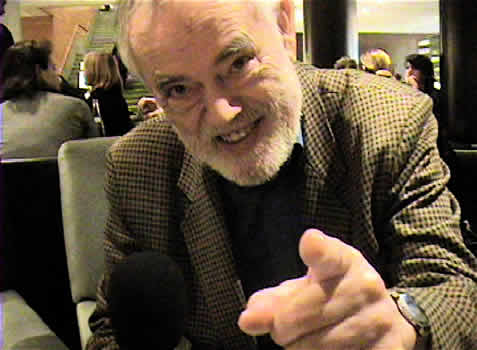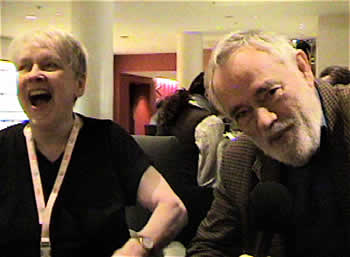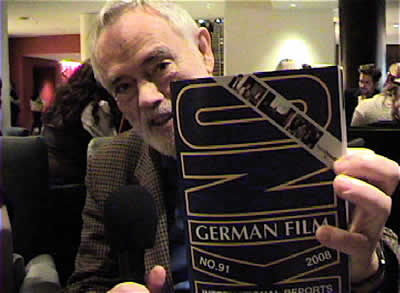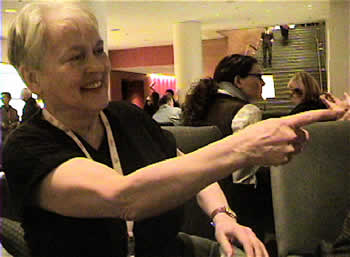Almost any veteran of the European film festival circuit knows of Ron and Dorothea Holloway, and if they don’t they should. As journalists, critics, publishers and filmmakers over the past 30-odd years, they’re Berlin’s longest-running co-production, a husband and wife team devoted to discovering and encouraging the art and appreciation of international cinema.
Since 1979, they have written and published their small, well-respected English-language magazine on German cinema, Kino, with a razor-thin staff and a loyal group of supporters, including some impressive advertisers. It says a lot about the esteem the German establishment holds them in – not to mention the couple’s charismatic approach to sales – that Lufthansa has reserved Kino’s back cover for decades.
That esteem was also evident at the 2008 Berlin International Film Festival, when festival chief Dieter Kosslick honored Ron and Dorothea with a special German Camera award for their career contributions to German film. For the ceremony, the festival screened their  documentary on the late great Soviet Georgian director Sergei Parajonnov, maker of the magnificent Shadows of Forgotten Ancestors, and who, like many filmmakers, was a good friend of the Holloways.
documentary on the late great Soviet Georgian director Sergei Parajonnov, maker of the magnificent Shadows of Forgotten Ancestors, and who, like many filmmakers, was a good friend of the Holloways.
For such a made-for-each other partnership, Ron and Dorothea hail from very different backgrounds. Dorothea’s trademark gusty laugh and dramatic flair perfectly fits her profession as a stage and screen actress (her professional name is Dorothea Moritz). When not performing professionally, she can sometimes be found holding readings of her beloved Schiller, the German poet, at film festivals and venues around Germany and Europe.
But who could imagine that Ron – mild mannered charmer that he is, with an Ernest Hemingway beard and Santa Claus eyes – actually trained to become a Catholic priest? Only when, some four decades ago, he wrote a book about religious themes in European cinema did he find his true calling in the sanctuary of the screening room rather than the Church. Marrying Dorothea gave the final blessing to this inspired defection.
“I am very proud to say that I stole the Catholic Church a priest!“ Dorothea laughs.
The two of them first met – where else? – at a film festival (Karlovy Vary in the Czech Republic, to be exact.) “After the festival I invited him to Hamburg but I didn’t think he would come,” reports Dorothea. “Fourteen days later this old American priest stands before my door. And I said okay, come in! And he never left.”
Thirty-some years later they’re still trekking to film festivals together, either as critics or jury members or reporters for Kino and other film magazines. Last year, Ron himself chalked up no fewer than 18 festivals, from St Petersburg to Sophia to Istanbul to Cannes. “He cannot live without festivals,” sighs Dorothea.
 I first met Ron when I became International Editor at The Hollywood Reporter back in 1989. Ron headed up our German bureau, which basically consisted of Ron’s home telephone and a fax machine. Each week he mustered a prolific output of ear-to-the-ground stories with an unflagging resolve, a discipline I can only imagine he somehow inherited from his more monastic days in the Church. He also had a terrific sense of all the goings-on of the German political and cultural scenes, which no doubt Dorothea helped tune.
I first met Ron when I became International Editor at The Hollywood Reporter back in 1989. Ron headed up our German bureau, which basically consisted of Ron’s home telephone and a fax machine. Each week he mustered a prolific output of ear-to-the-ground stories with an unflagging resolve, a discipline I can only imagine he somehow inherited from his more monastic days in the Church. He also had a terrific sense of all the goings-on of the German political and cultural scenes, which no doubt Dorothea helped tune.
I’ll never forget the day both of them showed me around the “new” Berlin on the first anniversary of the fall of the Wall. We climbed up to the last surviving guard tower overlooking the now defunct Niemandsland (No Man’s Land) that once skirted the east side of the old barricade. As we inspected the vast stretch of emptiness that would later become the corporate mosh pit of a reborn Potsdamer Platz, Ron and Dorothea shared their own long-lens view of German history, from Bismarck to Hitler to the era of Russian perestroika. Dorothea then scurried down the guardhouse stairs to take a picture from the ground of the two of us, standing on the lone tower with arms stretched out against the morning sky as if to greet – what? – some crazy new German future, perhaps. Of all the photos from my international treks, this one remains a favorite.
It’s their ability to seize any moment and make it their own that I remember best about my times with Ron and Dorothea, and it surfaced again on that anniversary day as we passed under the Brandenburg Gate. There were hucksters and street performers milling everywhere, kids munching bratwursts and Turks hawking East German uniforms and spray-painted chunks of the Wall. It all felt like a scene from some surreal  carnival, given the historic stage it was playing out on, with the ghosts of the Nazis and the Wall-jumpers all around.
carnival, given the historic stage it was playing out on, with the ghosts of the Nazis and the Wall-jumpers all around.
Suddenly Ron pointed up overhead to the top of a huge construction crane and what looked like, shockingly, a young man literally diving head first to his death above the crowds. “My god!” I gasped, flinching at this collision of revelry and terror that had just slammed into me.
“Bungee jumpers,” Ron smiled. “75 marks a jump, right over Hitler’s bunker.”
Later, when we had finished laughing, he added:
“Kind of like tragedy turning to farce, wasn’t it?”
In my best mock-editor voice I told him that was the most concise news analysis I’d heard of our day in Berlin. Speedily filed, too. Just like Ron.
Twenty years later I was wrapping up work at last February’s Berlinale when Ron and Dorothea invited me over to a friend’s home, across from their apartment overlooking the Spree River. We spent a couple of splendid hours watching the old videotapes that Dorothea had made all around the Wall as it fell in November 1989. It was the first time they’d seen them since she shot them. Needless to say, they both provided the running commentary, pointing out the names of the politicos making speeches, and the songs being sung as eager citizens (Ron and Dorothea included) took hammers to the Wall for  souvenir scraps. My favorite part showed long lines of East Berliners as they walked through the Wall’s first opening to discover, on the other side, hundreds West Berliners waiting to greet them with flowers and cheers. Dorothea the director made certain Ron the reporter popped up here and there with the microphone, interviewing the somewhat shell-shocked new émigrés on their stories, their plans and their feelings about being “witnesses to history.”
souvenir scraps. My favorite part showed long lines of East Berliners as they walked through the Wall’s first opening to discover, on the other side, hundreds West Berliners waiting to greet them with flowers and cheers. Dorothea the director made certain Ron the reporter popped up here and there with the microphone, interviewing the somewhat shell-shocked new émigrés on their stories, their plans and their feelings about being “witnesses to history.”
“Look at it,” Ron said as he watched the screen. “No violence and no bloodshed. Not a bullet fired anywhere.”
Dorothea nodded. “We showed the world how peaceful real revolution can be. On that day at least, we were all brothers.”
Somewhere buried in an old issue of Kino and sporting a shared by-line, I’m sure there’s a fine recap of those extraordinary days. As I used to remind my staff back in the trenches of the newsroom, great stories by great reporters never grow old.

